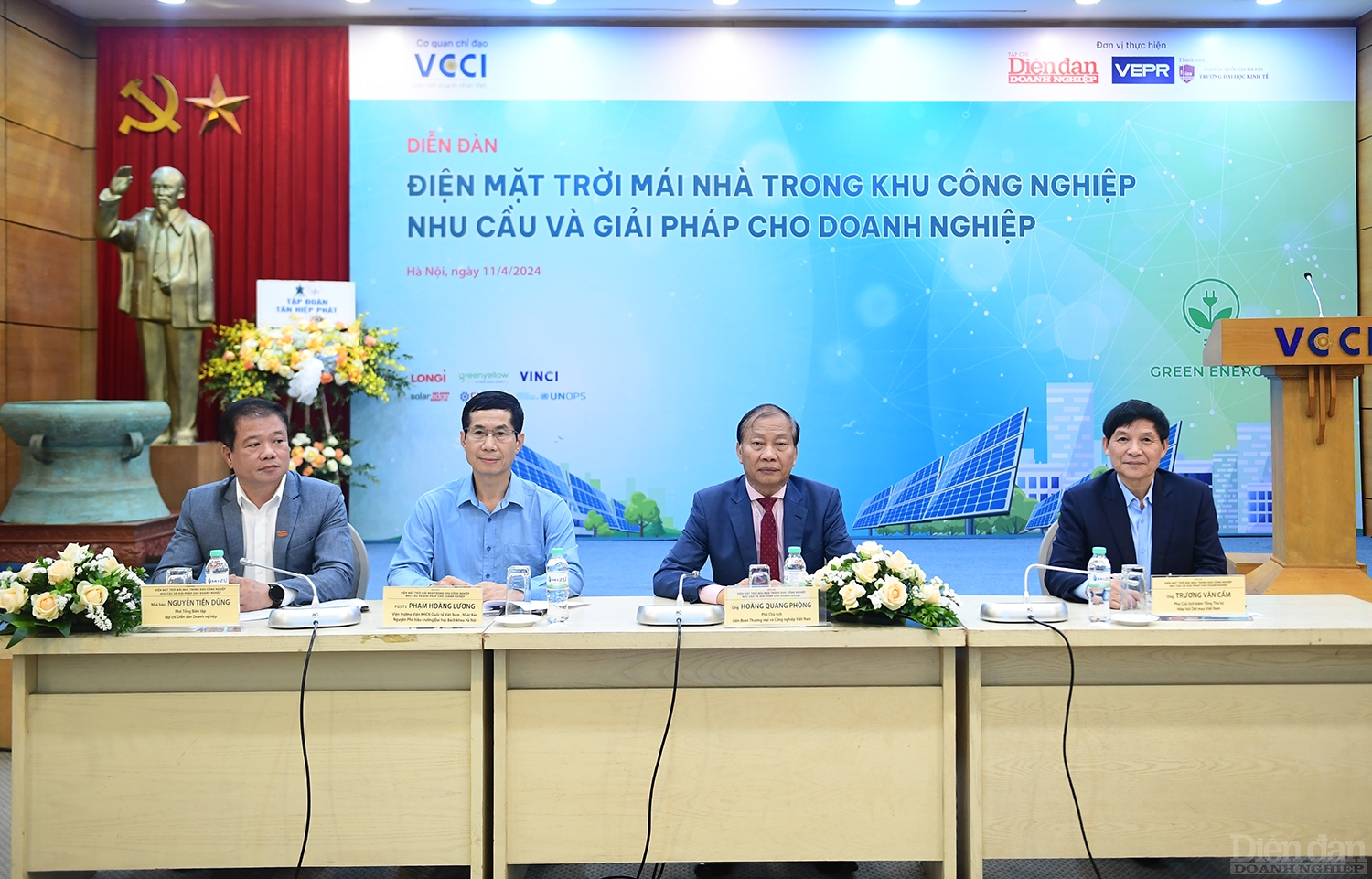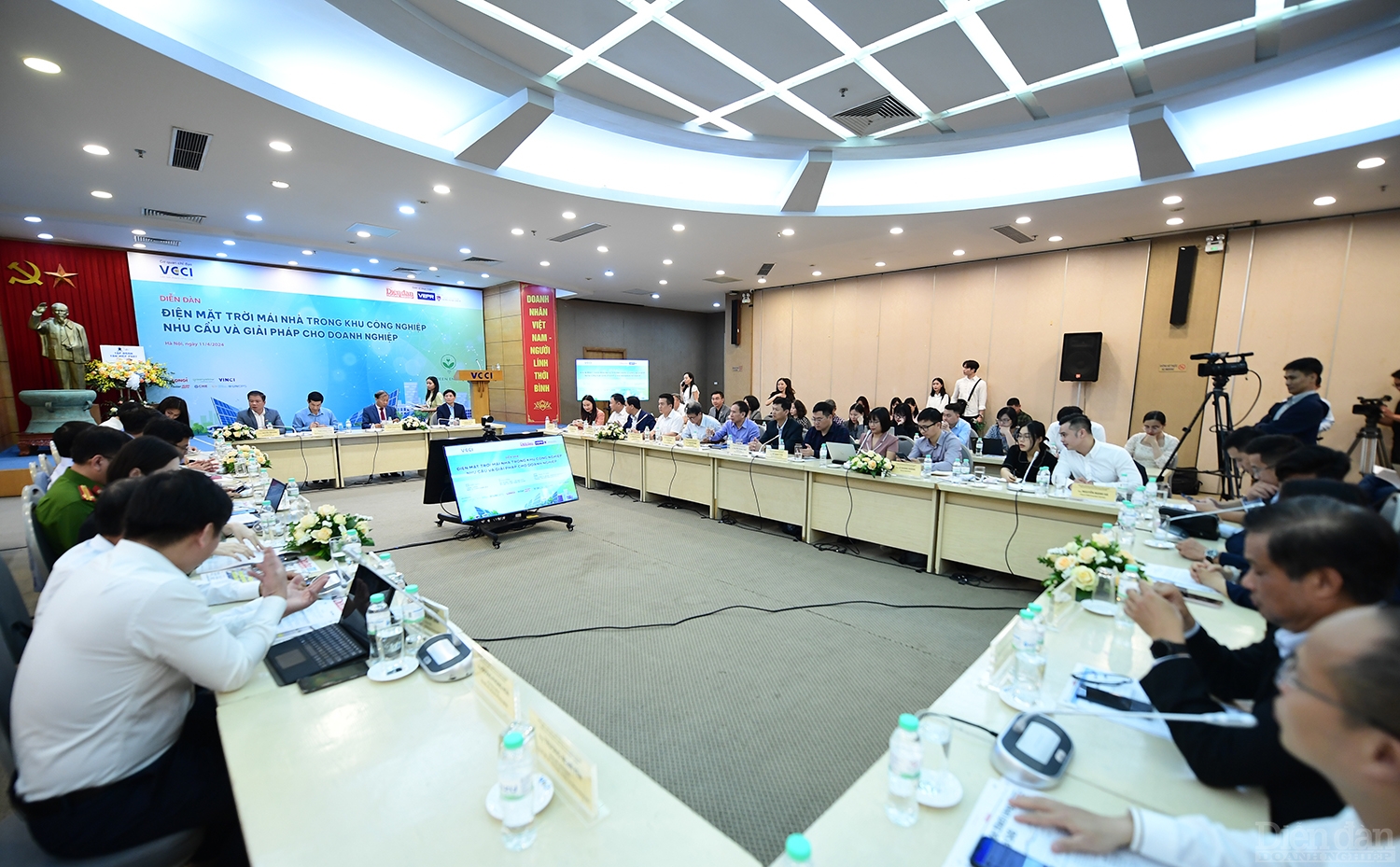Rooftop solar power in industrial zones: Solutions for businesses
At the Hanoi forum 'Rooftop Solar Power in Industrial Zones: Demand and Solutions for Businesses,' many experts shared their views on an important topic aimed at assisting Vietnam in meeting its green goals.

Vietnam has taken significant steps to meet international climate change obligations, with the goal of reaching net-zero emissions by 2050. Vietnam's Electricity Plan VIII promotes the use of renewable energy, particularly rooftop solar, in order to minimize reliance on fossil fuels and attain a goal of 50% self-produced, self-consumed solar electricity in government buildings and private homes by 2030.
To achieve this goal, the Vietnam Chamber of Commerce and Industry (VCCI), Business Forum Magazine, in collaboration with the Economic and Policy Research Institute (VERP) - School of Economics (Vietnam National University, Hanoi), organized the forum to listen to and synthesize recommendations from businesses, seeking solutions to promote the development of rooftop solar and propose appropriate policies to encourage installations, contributing to Vietnam's development.
At the event, Mr. Hoang Quang Phong, Vice President of VCCI, stated that using rooftop solar not only allows Vietnamese businesses to be proactive in power generation and reduce production costs, but it is also critical for international integration, as green certificates are required in free trade agreements. However, the deployment of rooftop solar panels for companies remains limit ed due to a lack of defined standards and norms.
Dual Benefits for Businesses
The construction of rooftop solar power systems in industrial zones is viewed as delivering two benefits: lowering energy costs and achieving green requirements, hence boosting exports to overseas markets like Europe. Many ministries and enterprises have advocated extending incentive mechanisms and system deployments. Furthermore, Vietnam is drawing international investment in sustainable energy projects that will bring significant value to the economy.
Assoc. Prof. Dr. Nguyen Anh Thu, Vice Rector of the School of Economics (Vietnam National University, Hanoi), highlighted that renewable energy is a priority in Electricity Plan VIII, which aims to satisfy the needs for a just energy transition. In accordance with this goal, the Ministry of Industry and Trade has issued a regulation encouraging rooftop solar installations. Renewable energy is expected to account for 30.9 - 39.2% of total energy consumption by 2030, rising to 47% in 2050. However, existing rules only stimulate the growth of self-produced, self-consumed rooftop solar for residential and governmental structures, which is not actively pushed in industrial areas.
Dr. Thu also stressed the need to improve institutions and regulations to stimulate investment in rooftop solar systems while lowering present legal impediments. The Economic and Policy Research Institute (Vietnam National University, Hanoi) is researching macroeconomic policies and reforms to stimulate green finance, generate employment, and strengthen Vietnam's position on the global value chain.
Urgent Solutions Needed
Mr. Truong Van Cam, Vice President of the Vietnam Textile and Apparel Association (VITAS), spoke at the Forum about the need of sustainable growth in the Vietnamese textile sector, particularly because these enterprises are usually located in industrial zones.
He also reviewed practical techniques for deploying rooftop solar systems in industrial zones, emphasizing that this is consistent with the national strategy of lowering emissions and achieving a Net-Zero target by 2050. However, he also stated that there is presently a legal void, notably after Decision 13/2020 expired, which has made it difficult for firms to engage in and deploy solar projects.

Mr. Cam identified issues such as panel disposal after use and financial support mechanisms for small and medium-sized businesses as critical in fostering sustainable business models and green transitions. He advocated for clear regulations and precise regulatory frameworks to allow businesses to effectively integrate renewable energy solutions, as well as assistance in educating the human resources required to operate and manage new energy systems.
During the discussion, Dr. Nguyen Quoc Viet, Deputy Director of the Economic and Policy Research Institute (VEPR), explored Vietnam's reluctance to transition to renewable energy to achieve climate change targets, particularly in light of international obligations such as COP56.
He stated that, despite the rapid expansion of the economy and energy demand, Vietnam continues to rely largely on fossil fuels and must enhance the usage of renewable energy to minimize CO2 emissions and meet the net-zero emissions target by 2050.
Dr. Viet emphasized the advantages of employing rooftop solar, particularly in industrial zones (IZs), because it not only assures a consistent power supply but also boosts production and business efficiency, allowing firms to satisfy international environmental requirements and improve their competitiveness. This is especially crucial if foreign markets apply more rules to reduce emissions.
Solar installations at the Deep C Industrial Zone (Hai Phong) are one example of the economic advantages, since they have generated substantial power and saved enterprises a lot of money. Despite the enormous potential, the growth of rooftop solar in IZs has not been optimized due to a lack of defined legislative mechanisms and impediments in investment procedures and processes.
Ms. Tran To Loan, Deputy General Director of the Sao Do Group, also discussed the development of Nam Dinh Vu Industrial Zone into an eco-industrial zone, underlining the need of using renewable energy to attract investors while simultaneously conserving the environment. Ms. Loan stated that, while progress has been made, the shift to renewable energy remains challenging owing to the lack of a power purchase mechanism in IZs, as well as related legal and legislative difficulties.
To address these challenges, Dr. Viet called on the government, international organizations, and banks to provide capital and encourage investment, as well as the prompt issuance of detailed legal documents on rooftop solar project planning, construction, environmental protection, and fire prevention.








